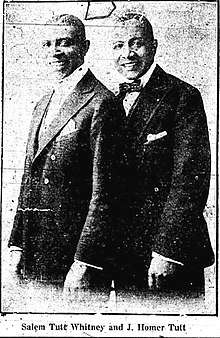Tutt Brothers
Salem Tutt Whitney (1869 – 1934) and J. Homer Tutt (1882 – 1951), known collectively as the Tutt Brothers, were American vaudeville producers, writers, and performers of the late 19th and early 20th century. They were also known as Whitney & Tutt, Tutt & Whitney and the Whitney Brothers. They were prominent in black vaudeville and created over 40 revues for black audiences.

Biography
Salem Tutt Whitney was born on September 16, 1878 (some sources say he was born in 1876, and still others say 1869) in Logansport, Indiana[1], as was his brother J. Homer Tutt, who was born there on January 31, 1882.[2] They referred to themselves as brothers, and may have been half-brothers.[3] Whitney originally intended to become a minister but later decided to become a performer, and left college.[2] He attended the National School of Journalism and gained amateur experience in acting, comedy and writing.[2] He married singer Emma Baynard (sister of William A. Baynard); she died at a young age in 1908.[4]
From 1888 through 1905, the brothers performed in their traveling tent show called Silas Green from New Orleans.[5] The show, which ran until the 1940s, was bought by circus owner Eph Williams although the brothers never received payment.[5][6] They formed the Smart Set Company in the 1910s, possibly taken over from Sherman H. Dudley.[3][7] From 1910–1925 Whitney and Tutt produced more than 40 revues for black performers and audiences, writing and performing in the shows themselves.[3] Some of their performers found fame in their own right, including blues singer Mamie Smith who danced in the brothers' Smart Set as a teenager.[3][8]
One of the Brothers' main productions was a musical farce called George Washington Bullion. Starring Whitney as a tobacco plantation owner, it was popular with audiences and ran for two decades.[6] Their musical Oh Joy! played on Broadway for four weeks.[6] It had originally starred Ethel Waters when performed in Boston, but when the only theatre space they could find in New York City was on a tennis court under a tent, Waters pulled out and was replaced by Ethel Williams.[3] Both of the brothers played in Marc Connelly's play The Green Pastures (1930).[6] They also acted in films including Birthright (1924), Marcus Garland (1925), The Broken Violin (1927), and A Daughter of the Congo (1930). Salem Tutt Whitney died in Chicago, February 12, 1934, and J. Homer Tutt died in Los Angeles, February 10, 1951.[3][9]
Works
- Silas Green from New Orleans (ca. 1903-ca. 1953)
- Blackville Strollers (1908-1909)
- The Mayor of Newtown (1909)
- George Washington Bullion (1910)
- The Wrong Mr. President (1913)
- His Excellency, the President (1914)
- George Washington Bullion Abroad (1915)
- How Newtown Prepared (1916)
- My People (1917)
- Darkest Americans (1918-1919)
- (The) Children of the Sun (1919-1920)
- Betwixt and Between (1920s)
- Bamboula (1921)
- Small Town Doings (1921)
- Jump Steady (1922)
- Oh Joy! (1922)
- North Ain't South (1923)
- Come Along Mandy (1923-1924)
- Who Struck John? (1923-1924)
- Hide and Seek (1924)
- Non-Sense (1925)
- When Malinda Sings (1925)
- Rainbow Chasers (1926)
- Deep Harlem (1929)
- The Witching Eyes (1929) directed by Ernest Stern[10]
References
- Floyd J. Calvin. "Salem Tutt Whitney Scores Poor Stage Facilities." Pittsburgh Courier, January 1, 1927, p. 13.
- Peterson, Bernard L. (2001). Profiles of African American Stage Performers and Theatre People, 1816-1960. Greenwood Publishing Group. pp. 266–269. ISBN 0-313-29534-4.
- Cullen, Frank; Hackman, Florence; McNeilly, Donald (2007). Vaudeville, Old and New. Routledge. p. 1136. ISBN 0-415-93853-8.
- Peterson (2001), p. 21
- Peterson, Bernard L. (1990). Early Black American Playwrights and Dramatic Writers. Greenwood Publishing Group. p. 9. ISBN 0-313-26621-2.
- Hill, Errol; Hatch, James Vernon (2003). A History of African American Theatre. Cambridge University Press. p. 209. ISBN 0-521-62443-6.
- In latter years, it was called The Smarter Set Company, possibly to avoid conflict with the publisher of the magazine The Smart Set.
- Oliver, Paul, "Smith (née Robinson), Mamie", The New Grove Dictionary of Jazz, 2nd edition, Oxford University Press, retrieved April 22, 2010
- "Salem Tutt Whitney, Veteran Actor, Dies in Chicago; Long Ill." New York Age, February 17, 1934. According to this obituary, S.T. Whitney was a native of Indiana.
- Workman, Christopher; Howarth, Troy (2016). Tome of Terror: Horror Films of the Silent Era. Midnight Marquee Press. p. 348. ISBN 978-1936168-68-2.
External links
| Wikimedia Commons has media related to Tutt Brothers. |